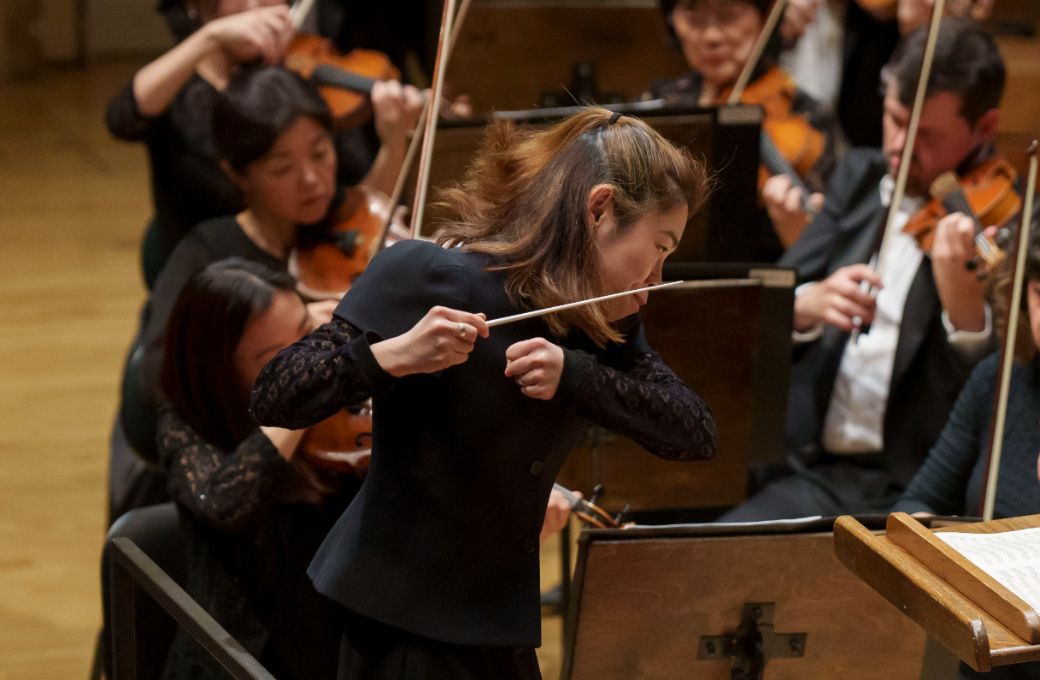Young conductors are having a moment in the United States. With 40-something music directors at three of its fellow Big Five orchestras (or technically, future music director in the case of New York), the Chicago Symphony Orchestra one-upped them by appointing not-yet-30 Klaus Mäkelä as its next Music Director. Riding this youth wave, 37-year-old Elim Chan has been introducing herself to American audiences all season, scheduling debuts in New York, Minnesota, Seattle and, this weekend, in Chicago. In a CSO subscription program anchored by her calling card, Nikolai Rimsky-Korsakov's Scheherazade, Chan's demonstrative, emotive conducting proved her mastery of the broad palette available with the world's best orchestras.

Ten years ago, Chan won the Donatella Flick LSO Conducting Competition with Scheherazade, and her deep-seated familiarity with the piece shows. Appropriately for a piece about storytelling, the listener experience of the piece is mostly linear, where Rimsky foregrounds one instrument, melody or rhythm at a time, in succession. Chan framed the throughline ably, coaxing background sounds to the background and allowing solo instruments to shine, especially the evening's concertmaster, Stephanie Jeong.
From her first spiraling statement of the famous violin theme, Jeong translated the storyteller's bewitching charisma to sound, pulling the listener into thrall with just enough vibrato, just enough rubato. Chan gave Jeong the space to seize the audience's attention, directing only the harp answers with a small fluttering of the fingers. Jeong's final harmonic, speaking clear and bell-like over the concluding bars, elicited contented aahs during the applause.
If Chan's granting of space to Jeong and the many other principal soloists in Scheherazade showed her discretion, her conducting with the ensemble showed her precision. Details as small as articulations came through in her body language, and the control of the dynamics and tempo changes in the long final crescendo made clear her vision and preparation, with the orchestra on board. Everything felt considered, with even the many statements of the fanfare motif all shaded differently.
Chan's broad lexicon of gestures sets her apart as a conductor. Even little leans and jerks illustrate her take on the music, with an active left hand and fluid posture. Beyond the nuanced communication with the orchestra, Chan's movement presents an almost choreographic translation of her interpretation for the audience as well. One gesture in particular seemed like a Chan signature: a quivery baton calling for more expression or drama, like “electrify this moment”.
Before intermission, Chan led Weber's Overture to Der Freischütz and Samuel Barber's Toccata festiva, with Paul Jacobs soloing on Symphony Center's Casavant Frères 1998 pipe organ. Jacobs, a frequent guest of the CSO, utilized the full spectrum of colors available on the midsize, 3,400-pipe instrument, changing registrations so the melody emerged from different parts of the hall, finding a spooky whistle rank to color a hair-raising passage, and rumbling the rafters with the 32-foot stops. His encore, Charles Ives' Variations on America for solo organ – about half the duration of the Barber – showcased the palette even further, at turns hymnic, jaunty, silly, squirrelly, constipated and ballparky.
First but not least, Chan's interpretation of the Weber made the case for it as more than something to fill the time until the concerto. She made a surprisingly subtle gesture to start the piece, getting a nearly attack-free sound from the strings. Her pianissimo cut-offs were similarly tiny, once moving only the third finger of the left hand in a minute circle. The orchestra, always laser-exact and responsive, seemed even more keyed-in than usual.
It was an auspicious local debut for Chan, who seems likely to land a high-profile gig or two during this youth movement. If it's splashy to book a talented young conductor, it'd be even splashier to book a talented young female conductor.


